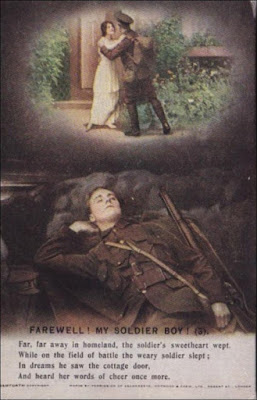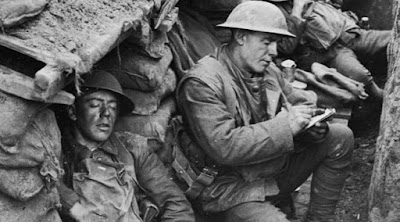“The Tommy is a
singing soldier,” wrote Patrick MacGill in the Preface to his 1917 volume of
poetry, Soldier Songs. An Irishman
serving with the London Irish Rifles, MacGill continued,
The soldiers have songs of their own,
songs of the march, the trench, the billet and battle. Their origin is lost;
the songs have arisen like old folktales, spontaneous choruses that voice the
moods of a moment and of many moments which are monotonously alike. Most of the
verse is of no import; the crowd has no sense of poetic values; it is the singing
alone which gives expression to the soldier’s soul.
His poem “A
Lament” (sometimes titled “A Lament from the Trenches”) is one such whimsical, melancholy
expression.
 A Lament
A Lament
(The Ritz-Loos
Salient.)
I wish the sea
was not so wide
That parts me from my love;
I wish the
things men do below
Were known to God above.
I wish that I were back again
I wish that I were back again
In the glens of Donegal,
They’ll call me
a coward if I return
But a hero if I fall.
“Is it better to
be a living coward,
Or thrice a hero dead?”
“It’s better to
go to sleep, m’lad,”
The
colour-sergeant said.
Loneliness permeates the poem’s first stanza. As in a
tale of folklore and magic, a man makes three wishes, and they reveal a soldier who is heartsick, homesick, and abandoned by God. Separated from his beloved, detached from a distant
God, and impossibly remote from the landscape of his childhood, the soldier is
alone with the realization that there is no winning his war. If he returns to his village, he will be
labeled a coward; respect and honour can be achieved only with his death.
Caught on the
horns of the dilemma, he turns to his commanding officer and asks whether it
is better to live as a coward or die as a hero. The colour-sergeant responds
with affection, addressing the young man as “m’lad,” but avoiding the unanswerable
question. Instead, with calm and good sense that seem almost paternal,* the
sergeant urges the young soldier to take one of the few comforts available in
the trenches: to sleep.
 Close bonds
of comradeship caused many of the soldiers of the First World War to reflect,
without irony, that their experiences in combat were some of the happiest of
their lives. Shortly before his death, Wilfred Owen wrote his mother,
Close bonds
of comradeship caused many of the soldiers of the First World War to reflect,
without irony, that their experiences in combat were some of the happiest of
their lives. Shortly before his death, Wilfred Owen wrote his mother,
So thick is the smoke in this cellar that
I can hardly see by a candle 12 inches away.
And so thick are the inmates that I can hardly write for pokes, nudges,
and jolts. On my left, the company commander snores on a bench. It is a great life….I hope you are as warm as
I am, soothed in your room as I am here. I am certain you could not be visited
by a band of friends half so find as surround us here.
Edgar Jones, in “The
Psychology of Killing: The Combat Experience of British Soldiers during the
First World War,” asserts, “The intensity of the soldiers’ experience
was often so great that it is difficult to imagine anything in civilian life
that came anywhere close to these bonds.”
In the Preface
to Soldier Songs, Patrick MacGill recalls another
lyric that “echoed in billets and dug-outs from Le Harve to the Somme.” It is a
lullaby of sorts, a gently ironic reminder of the bonds of comradeship
that got men through the war.
Sing Me to Sleep
Sing me to sleep
where bullets fall,
Let me forget
the war and all;
Damp is my
dug-out, cold my feet,
Nothing but
bully and biscuits to eat.
Over the sandbag
helmets you’ll find
Chorus.
Far, far from
Ypres I long to be
Where German
snipers can’t get at me,
Think of me
crouching where the worms creep,
Waiting for the
sergeant to sing me to sleep.
Sing me to sleep
in some old shed,
The rats all
running around my head,
Stretched out
upon my waterproof,
Dodging the
raindrops through the roof,
Dreaming of home
and nights in the West,
Somebody’s
overseas boots on my chest.
---------------------------------------------------------------------------------------------------
*For more on the
father-son bond in war, see Lieutenant E.A. Mackintosh’s poem “In Memoriam”; it
speaks eloquently about the “fifty sons”
under his command.


Does anyone have the music to 'Sing me to sleep' ?
ReplyDeleteI don't know anything about the music, but if you find it, I'd love to hear it and learn more....
Delete